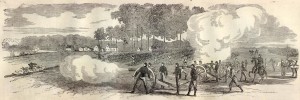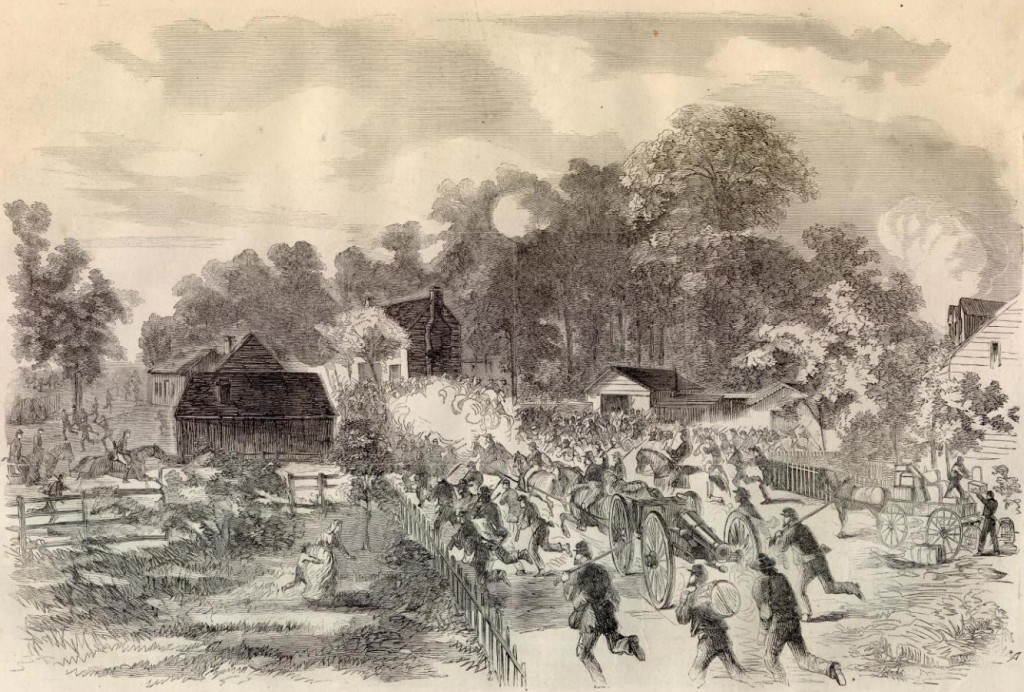There was a fight near Mechanicsville, Virginia on May 23-24, 1862. It involved the Union brigade led by General John W. Davidson. The 33rd New York Infantry Regiment took part. Apparently a member of the band wrote the following letter home. It was not a big fight, but there were a couple Union deaths and some close calls (even for a horse).
Published in a Seneca County, New York newspaper in 1862:
From the Thirty-Third Regiment.
CAMP IN THE WOODS, FIVE MILES FROM RICHMOND, Va.,
May 27th, 1862.
I have just been out to the edge of the woods, to take a peep at the rebels, through a glass. They are about a mile distant on the opposite hill, with a small creek between us. Last Friday afternoon we went out with our brigade, consisting of the 33d, 49th, and 77th, New York regiments, the 7th Maine, one squadron of Cavalry and one battery of Artillery to have a little brush with the rebels, who occupied a small town called Andover, about two miles to our right, and five miles directly north of the far-famed city of Richmond. We came up within range of the enemy’s guns at about three o’clock in the afternoon, when they opened on us with three pieces of artillery, which we promptly responded to by our guns, and kept up until almost sundown, when they undertook to outflank us on the left. Gen. DAVIDSON sent the cavalry around to head them off, which they did in good style, without losing a man. About dusk the men fell down upon their arms and slept until morning. Early in the morning we were all up and under motion. Companies K., G. and B. of our regiment were thrown out as skirmishers, and we moved up to within five hundred yards of the enemy’s lines, where they again opened on us. Our artillery got a position where they could get a range on their battery from three different points, and soon drove them from the field; their men were hid in the houses, and fired with their muskets at our skirmishers, killing DANIEL MURPHY, of Company K. As soon as we found where the rebels were secreted, the artillery directed their fire upon the houses, and “of all the running,” I ever saw, I think this was a little the best. Our men took possession of the town, and destroyed the bridge across the creek. We found five or six wounded rebels they had left in their hurry to get away. An old darkey who came in shortly after, said they carried four wagon loads of dead and wounded off with them, while we had only two killed and three wounded. Col. MASON, of the 7th Maine, was riding along across the field, when a cannon ball passed under his horse, and the shock was so great that he fell as quick as though it had passed through his heart. The horse fell on the Colonel and injured him quite severely. I saw a ball knock a blanket off the back part of one of the cavalry men’s saddle, but it was so nearly spent that it did not hurt him. Two balls were fired at our regiment as we moved up in line of battle; one of them came directly over our (the band) heads, so near to me that I could feel the wind from it quite sensibly. We staid out there until yesterday forenoon, and then moved back to this point, leaving the cavalry to guard the place. We are under orders to keep three days rations in our haversacks, and the men to keep sixty rounds of cartridges with them all the time, and when the order comes to move we are to go “light,” (that is without knapsacks or blankets,) and to be prepared for a “big fight” or a “big run” as that will be altogether owing to how the rebels stand the shock. We are forbidden to write anything about the position of our troops, size and number of our guns &c., &c., but I will say that no doubts are entertained as to the final result of the contest when it does come. All the boys are in excellent spirits and eager for the ball to open. Perhaps ere this reaches you many of us will be sent to our long home. No one can tell who it may be, but each feels quite confident that it will not be himself.
Ever Yours,
W.M.S.
I’m guessing that W.M.S. is the following William M. Smith. Could he have deserted?
Son of the South publishes the June 21, 1862 issue of Harper’s Weekly issue that reported on and illustrated the fight. The story of the Thirty-third N.Y.S. vols.; or, two years campaigning in Virginia and Maryland, by David W. Judd reported on Mechanicsville and backed up some of Smith’s facts. David W. Judd, the author, believed the Union army could have taken Richmond if Davidson’s brigade had been reinforced right after the rebels fled.



